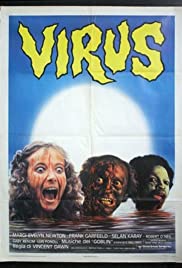
VIRUS
US/Japan, 1980, International version 100 minutes, Japanese version 155 minutes, Colour.
Sonny Chiba, Glenn Ford, Robert Vaughn, Henry Silva, George. Kennedy, Olivia Hussey, Chuck Connors, Bo Svenson, Ces Linder, Edward J. Olmos.
Directed by Kinji Fukasaku.
Virus is a big-budget spectacular disaster film, a co-production between Americans and Japanese. The film is predominantly American. However, the hero is Japanese and in the longer version there is a focus on the virus and its effect on Japan.
The film is one of nuclear fear and holocaust. The detente between East and West in nuclear armaments causes developments in weapons for germ warfare and a virus is loosed on the world - with almost 100% destruction. A small group of survivors in the Antarctic is threatened with nuclear destruction and a heroic trip is made to Washington to turn off the button. As with so many films of the '80s, like The Day After and Testament, the bomb goes off.
The film was made in Alaska with most attractive scenery. There are some good special effects. The international cast (not first-rate) is effective in this kind of film. The film ends with a hopeful note - and a rather trite song by Janis Ian: 'Not Too Late to Start Again' . Interesting as a popular theme for such an expensive international co-production.
1. The '80s and the focus on holocaust and apocalyptic end to the worlds The enjoyment of the film as story, parable? Message - war and peace?
2. Japanese-U.S. co-production? The significance of the plot? The quality for box-office? Technical credits? Cast? The emphases for the international version?
3. The range of world locations - the virus attacking the various capitals of the world? International interest? Alaska standing in for Antarctica? Isolation and beauty? Places of disaster and death, places of peace? The musical score? The message about the world: the arms race, defence, East and West, nuclear potential, destruction, survival? Values? Heroism? Images of the worst happening? A new beginning? The final peaceful sequences of Antarctica? The lyrics of Janis Ian's song?
4. The virus theme: the opening, the doctor, international dealings, money, the raid, the plane crashing and releasing the virus, the Italian flu and its universal panic and devastation? Repercussions? The U.S. and the collapse of its might? The death of the Soviet Chief? The military solution?
5. The Chiefs of Staff? The cover-up about the virus? The military man put in the asylum? The reaction of the President? The White House? The President and his having to cope? The Senator and his support? Their deaths? The military and the cover-up, the nuclear alert? American power destroyed? The speeches about nuclear armaments?
6. The Japanese focus: the opening, death and survival, the hero in Antarctica, his falling in love, his going on the mission, future? The pilgrim theme: the survivor at the end of the world, the fallen crucifix, his communing with God, his determination to return? The religious themes? The focus on the character, his prediction about the earthquakes, the challenge to Carter, going to Washington? His failing? His being immune? The future?
7. Antarctica: a microcosm of the United Nations, the breaking down of hostilities, the Norwegians going berserk and the girl surviving, her baby? Law, human relationships? The rape? Sexuality and the propagation of the race? The ease of living together, hardships?
8. Conway and his control? The British? The anticipation of the earthquake? The mission? The group escaping? The range of types represented? The expedition: the British, Carter and his toughness, the clash with the Japanese hero, their working together, the injuries, deathly Washington, the button, the failure? The explosion?
9. The survivors and new hope? The heroine and her baby? The lyrics of the song?
10. How well did the film work at a popular level? Entertainment? The picturing of the end of the world - and hope for new beginnings?